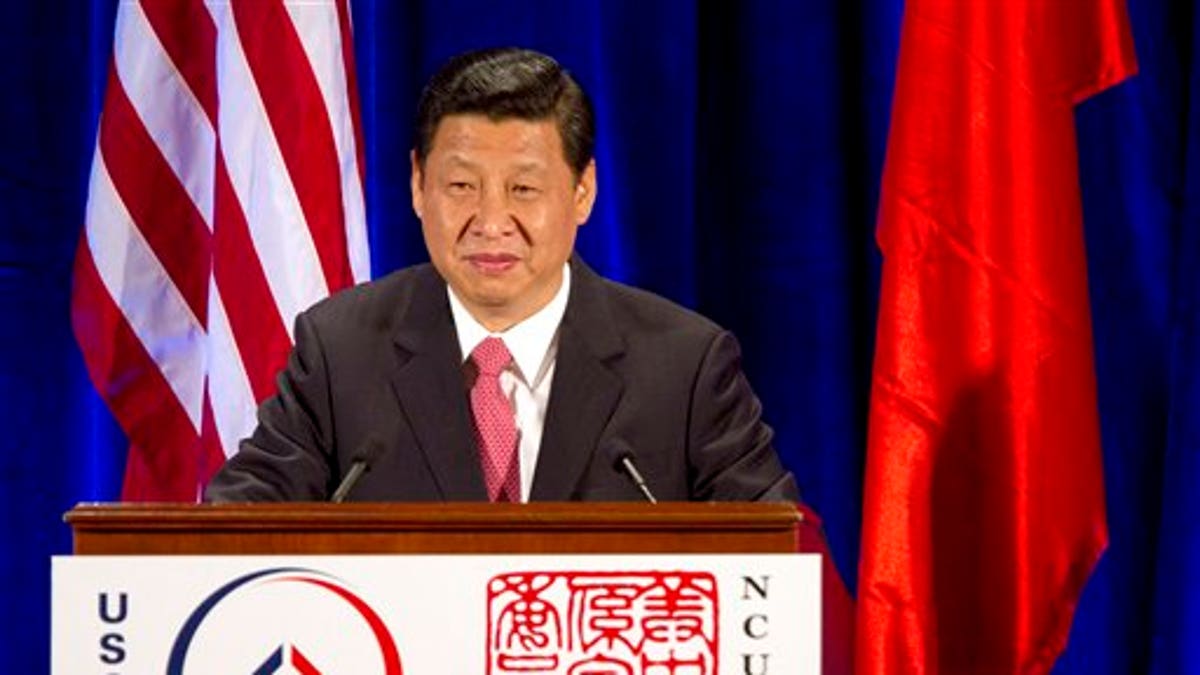
Feb. 15: Chinese Vice President Xi Jinping speaks to the U.S.-China Business Council in Washington. (AP)
WASHINGTON – For Americans looking at the U.S. visit of China's likely future leader for a clue about where relations between the two nations might be headed, the signal has been clear: No change in substance, but perhaps a change in style.
Chinese Vice President Xi Jinping toed the line set by the man he is set to succeed as Communist Party chief in the fall, Hu Jintao, who made a grand U.S. state visit a year ago.
Xi, who is expected to become president in 2013, made clear that China wants a deeper relationship with the United States and even welcomes its engagement in the Asia-Pacific, as long as it respects China's interests and concerns in its own neighborhood.
"It was a scripted trip without surprises," said Jeff Bader, East Asia policy director during the first two years of the Obama administration. "He obviously wasn't here to make policy, or make decisions or alter positions on issues. He is not the No. 1 yet and he doesn't want to prejudice his chances of being No. 1."
But while Xi, 58, has said little new -- and did little to narrow the gaping differences that exist between the U.S. and China on issues such as human rights -- he made a conscious effort to appear less remote than the stiff and aloof Hu.
"He's more interactive than past Chinese leaders. He looks you in the eye, and you feel he's conversing with you," said Bader, who spoke briefly with Xi on Wednesday.
Mindful that Xi likely will lead China for the next decade, Washington pulled out the stops to make him feel welcome. He held a long meeting with Obama and received a 19-gun salute at the Pentagon -- unprecedented for a visiting vice president.
His two-day swing through the power centers of Washington is being followed by a trip to Iowa, where Xi visited in 1985 as a county-level official to learn about crop and livestock practices. He will round off his U.S. visit in California.
The Iowa trip in particular will be another opportunity for Xi to show a more personal side and appear less wooden than Hu. He will meet hosts from that trip in the small farming community of Muscatine, where Xi is remembered as handsome and polite 31-year old who was intensely focused on learning as much as he could.
"I'm flabbergasted that he would take time out of his busy schedule and come back to Muscatine," said Eleanor Dvorchak, whose family hosted Xi for two nights during the visit 27 years ago.
Before leaving for Iowa on Wednesday, Xi, who has a daughter at Harvard University, used the main policy speech of his U.S. visit to call for more people-to-people ties between the world's two largest economies.
Steering away for a while from the diplomatic-speak characteristic of a Chinese leader, Xi recounted at length a personal story about how, as an official serving in the Chinese province of Fujian in 1992, he had helped an American widow reunite with the elderly friends of her husband who had lived as a child in the province.
That said, Xi also has been sure to restate standard Chinese positions, urging the U.S. to oppose any moves toward Taiwanese independence and not meddle on the issue of Tibet, where sentiment against anti-Chinese rule has flared with a spate of self-immolations by Buddhist clergy who support their exiled leader, the Dalai Lama.
"He goes back home having burnished his leadership credentials, showing he's ready to take command and manage relations with the U.S. and state Chinese positions forthrightly," said Evans Revere, a former senior State Department official on East Asia.
Xi also heard plenty of critical voices -- a reflection of the gamut of issues on which Washington and Beijing don't see eye-to-eye, and which also are likely to intrude on the U.S. presidential campaign this year.
Xi would have seen the boisterous Tibetan protesters yelling anti-China slogans outside the White House on Tuesday. He listened to business executives and officials' concerns about unfair trading practices and hurdles to American investment. He also got an earful from a Congress that is never shy about airing its criticism of Beijing.
Xi met with House leaders, and Speaker John Boehner, R-Ohio, delivered a letter regarding the plight of Gao Zhisheng, a dissident and human rights lawyer imprisoned in China.
The Chinese vice president also faced tough criticism from senators on human rights and allegations that China manipulates its currency to help its exporters. They also raised China's veto of a recent U.N. Security Council resolution to condemn the bloody crackdown by Syria's government on its opponents.
John Park, an expert on East Asia and research fellow at Harvard University's Belfer Center, said Xi will face many internal challenges when he takes the helm in China and a change in leadership style won't necessarily mean a new chapter in U.S.-China relations.
"There's been a lot of reading into the fact he spent some time in Iowa. Maybe that was something of a formative experience," Park said. But he added that it does not mean Xi will be a reformer.
